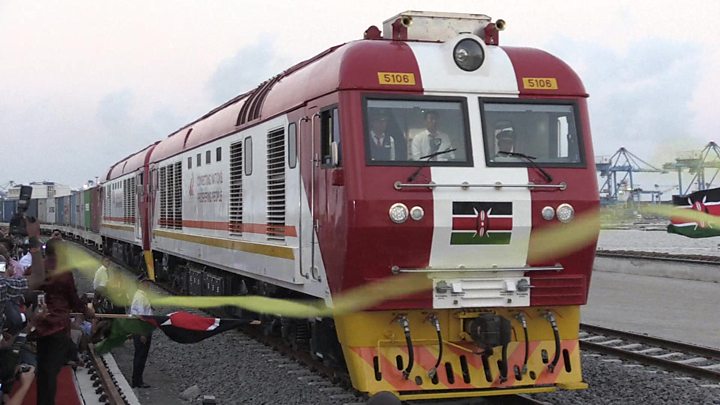If it was not for the standard gauge railway (SGR) train, Gilbert Wandera, a businessman in Nairobi, Kenya’s capital, would not have taken his family for this Easter holiday to Mombasa, a tourist resort in the coastal region.
Wandera booked the SGR train , dubbed Madaraka Express over a month in advance for his wife and three children and on April 18, the family travelled to Mombasa from Nairobi using the train.
“We are travelling back on April 23 still with the train because I booked a return ticket,” said Wandera on Monday, terming the service “godsend”.
The family of five is among hundreds of the East African nation’s residents who flocked to the coastal city during the Easter holiday, thanks to convenience and affordability of the train.
Over the years, transport had been a major hindrance for many would-be domestic tourists. For those who thought of flying, this was too expensive because airlines charge up to 15,000 shillings (150 U.S. dollars) return ticket per person.
Driving was another option for families, but this came with many risks on the road with the Mombasa-Nairobi highway recording one of the highest numbers of road accidents.
Going by bus was another route, but sometimes it takes up to 10 hours to reach the coastal city from Nairobi due to traffic jams.
“The train is a perfect service and it is the reason why I travelled to the Coast because you are assured of your journey,” said government auditor Jane Wamalwa, who travelled to Mombasa, then further down to Malindi.
Among popular spots domestic tourists visited in Kenya’s coastal region during this Easter were the beaches, which were mainly populated by ordinary Kenyans this time round unlike the past where international tourists dominate.
Most of the hotels, lodges, tented camps and holiday homes recorded over 80 percent occupancy and brisk business during this Easter, according to Victor Shitakah, chairperson of Kenya Coast Tourist Association.
Other things making Kenyans warm up to domestic tourism besides availability of good transport include improved security and growing economy.
In the financial year 2017/18, Kenya’s domestic tourist bed nights stood at 3.67 million, up from 3.64 million in 2015/17, according to the Kenya Tourism Board (KTB), with the Kenyan coast destinations like Mombasa, Malindi and Watamu being the favourite.
Other towns that also attract local tourists include Naivasha and Kisumu.
The train, which is built by Chinese, contributed significantly to the numbers, with the service ferrying 1.7 million passengers between Mombasa and Nairobi in 2018, latest Kenya National Bureau of Statistics (KNBS) data showed.
In April 2018, when Easter holiday was marked, the train ferried 140,581 passengers, one of the highest numbers last year. Some 165,971 people were ferried in August 2018, another holiday season.
Similarly, some 153,885 were ferried in November 2018 and 186,718 in December 2018, up from 133,618 and 145,180 respectively in 2017, according to KNBS.
“The train definitely has been a game-changer in the tourism industry for the benefits it offers which are convenience, affordability and advanced booking, which enables ordinary Kenyans, but especially those in the middle-class, plan for their trips,” said Ernest Manuyo, an analyst at Pioneer Institute in Nairobi.
International tourist numbers stood at 2.02 million in 2018, with most of the tourists similarly travelling to the coast via the train service.






